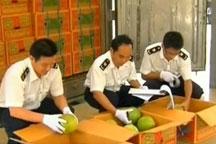China-ASEAN fruit trade tariff free
2009-10-22 08:45 BJTSpecial Report: The 6th China-ASEAN Expo |
Watch Video

 Play Video
Play Video
The Memorandum of Understanding on Agriculture signed in 2002 started a new page for China-ASEAN agricultural cooperation. According to the agreement, tariffs of import products will gradually be eliminated. By 2010 more than 7,000 products will be free of tariffs. Ten percent of those are agricultural products and foods.
Mr. Zhu is a fruit wholesaler in Guangxi's Nanning city, he's been in this business for more than ten years. Prices used to be high, and not many citizens bought his fruits.
Since the implementation of the "Zero Tariff", fruits from ASEAN nations are much cheaper than before. Fruits from Thailand used to be called "royal fruits", but now they are part of common people's life. Citizens in Nanning can easily find durian from Thailand, bananas from Malaysia, and mangoes from Vietnam.
Ou Guilan, Director of Technlogy Instruction Station said "After the implementation of the "Zero Tariff" between China and Thailand, fruits used to sell at twenty yuan or more per kilogram, but now they have been reduced to acceptable prices for common people."
By establishing the FTA, transportation costs have also been reduced, bringing more fresh fruits to consumers.
Zhou Buguang, Manager of Guangxi Yinju Export & Import Co., Ltd. said "It used to take more than 8 days by sea, sometimes two weeks, but now it takes only two days to arrive by port. Now fruits are much fresher."
Ping Xiang Port is the largest port for China-ASEAN fruit trade, accounting for nearly 30 percent of the total fruit trade between the two sides. Last year, it accounted for more than 350 thousand tons of produce, worth more than 110 US dollars.
Related stories
- Sino-Myanmar trade boosted with China-ASEAN Expo 2009-10-22
- FACTBOX: Trade between China and ASEAN 2009-10-22
- Surging trade between China, ASEAN 2009-10-21
- Agricultural products takes spotlight at China-ASEAN Expo 2009-10-20

 Mail
Mail Share
Share Print
Print


 Video
Video









 2009 China Central Television. All Rights Reserved
2009 China Central Television. All Rights Reserved